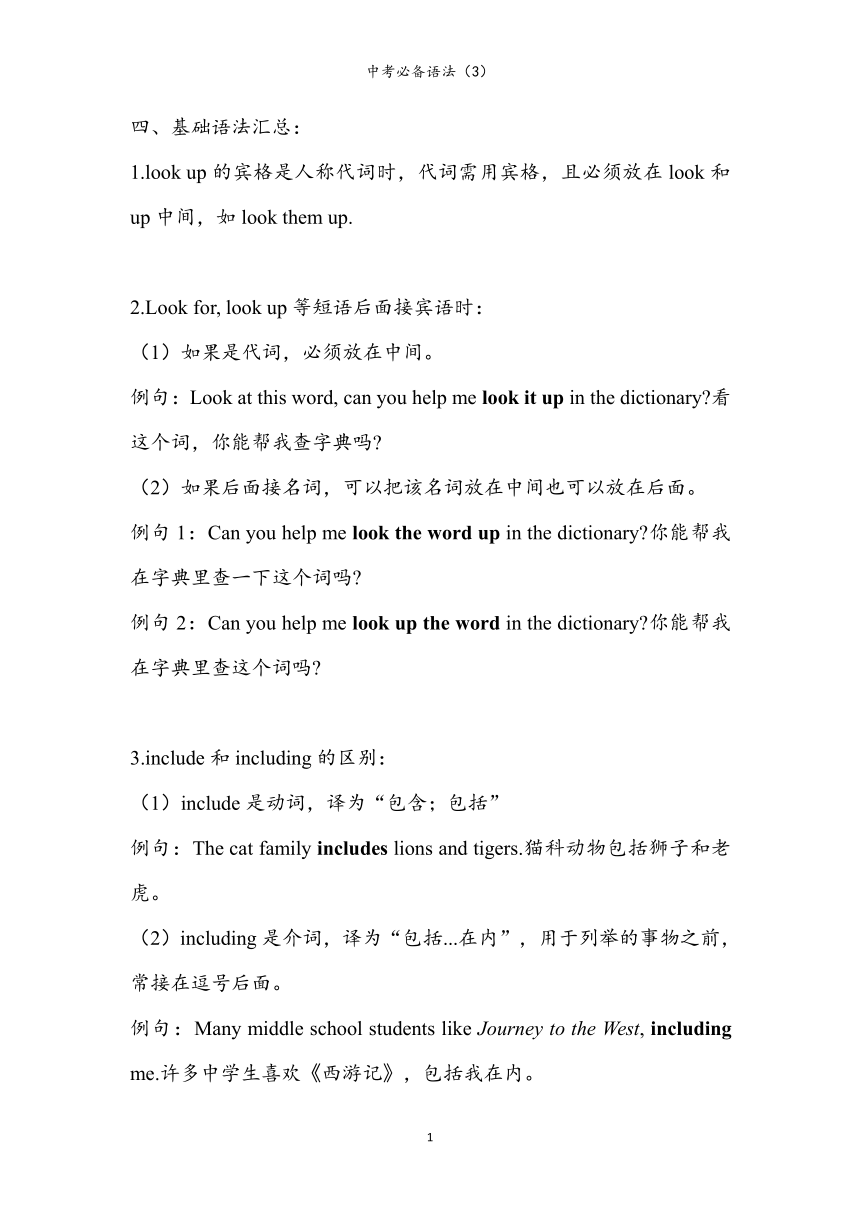
中考必备语法(3) 四、基础语法汇总: 1.look up的宾格是人称代词时,代词需用宾格,且必须放在look和up中间,如look them up. 2.Look for, look up等短语后面接宾语时: 如果是代词,必须放在中间。 例句:Look at this word, can you help me look it up in the dictionary 看这个词,你能帮我查字典吗 如果后面接名词,可以把该名词放在中间也可以放在后面。 例句1:Can you help me look the word up in the dictionary 你能帮我在字典里查一下这个词吗 例句2:Can you help me look up the word in the dictionary 你能帮我在字典里查这个词吗 3.include和including的区别: (1)include是动词,译为“包含;包括” 例句:The cat family includes lions and tigers.猫科动物包括狮子和老虎。 (2)including是介词,译为“包括...在内”,用于列举的事物之前,常接在逗号后面。 例句:Many middle school students like Journey to the West, including me.许多中学生喜欢《西游记》,包括我在内。 4.当hundred, thousand, million和billion与具体数字搭配时不加s,且不能和不可数名词连用。 例句:There are two hundred books in our library.我们图书馆里有200本书。 5.数以百计是“hundreds of”, 数以千计是“thousands of”, 数以百万计是“millions of”. 例句:There are hundreds of books in our library.我们图书馆里有几百本书。 规律:具体数字两无(无of, 无s),模糊数字两有(有of, 有s)。 6.“数词+more+名词”和“another+数词+名词”,译为“再多”,表示在原来的基础上又增加了数量。 例句:I shall stay another four months.我将再待四个月。 例句:He decided to have one more try.他决定再试一次。 7.any other +名词单数,而the other +名词复数。 例句1:Tom is teller than any other boy in his class.汤姆比他班上任何一个男孩都更会说话。 例句2:Tom is teller than the other boys in his class.汤姆比他班上的其他男孩更会说话。 such as和for example的区别: such as后面常跟名词或者动名词,常跟着多个例子。 例句:I have a lot of hobbies, such as swimming and running.我有很多爱好,比如游泳和跑步。 for example后面常跟着句子,且只带一个例子。 例句:I have a lot of hobbies. For example, I like swimming.我有很多爱好。例如,我喜欢游泳。 only放在句首,主句要倒装。 例句:Only since last year have I been used to living in the countryside.只是从去年起,我才习惯住在农村。 既能接不定式,又能接动名词,但是意思不同的动词或者词组:forget, go on, mean, remember, stop, try, regret. 接不定式的有:tell, ask, want, decide等。 例句:I want to play basketball.我想打篮球。 接动名词的有:finish, practise, mind等。 例句:Have you finished reading the book 你读完这本书了吗 How soon和how far的区别: (1)How soon译为“过多久”,一般用在将来时中,通常用“in+一段时间”回答。 例句:———How soon will the invitation be sent to our guests 邀请函什么时候能寄给我们的客人 ———In two days.两天后。 (2)How long译为“多长时间”,提问时间段,通常用“for+一段时间”回答。 例句:———How long have they studied English 他们学英语多久了 ———They have studied English for two years.他们已经学了两年英语了。 every和each的区别: (1)every译为“(与单数名词连用,强调整体)每一个,每个”;each译为“(两个或两个以上的人或物中,强调个体)各自,各个,每个”。 (2)every可以与almost, nearly和数词等连用 ... ...
~~ 您好,已阅读到文档的结尾了 ~~